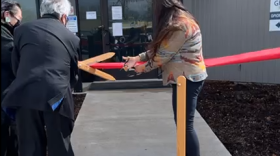Native Americans needing help with addiction and substance abuse have an option opening this month in the Yamhill County town of Sheridan. The Confederated Tribes of the Grand Ronde’s new residential treatment facility, Main Street Recovery,had its grand opening Monday, Feb. 24, and is now taking referrals.
“It really turned out amazing. We did a blessing ceremony on Friday,” said operations director Jennifer Worth, walking through a space that looks more like a mansion than a recovery center. She showed parts of the building where clients will sleep, meet, do chores, and get counseling and case management services.
Other features include bathrooms for both residents and visitors, a workout room, kitchen, and—possibly some day—trails and a pickleball court.
Worth told KLCC that any Native American 18 or older contending with addiction can be helped here, if they’re medically stable and beds are available. Stays will be done on a case-by-case basis, with many expected to be six months or longer.
“Other things we’re working on is hopefully adding a sweat lodge in the back,” Worth added, after pointing out Native American art and accents inside the space.

Kelly Rowe, executive director of tribal health services for the Grand Ronde, told KLCC that the facility integrates Western medicine with Native practices.
“Culture is medicine for us,” said Rowe. “We want our tribal members—as well as other Natives—to feel that they’re part of something bigger and that we’re here for them.”
The recovery center is also close to the CTGR’s reservation, and was partially paid for by funds from a multi-state opioid settlement. It will start taking clients next week.
This is the third site that’s forming the tribe’s “continuum of care,” according to both Rowe and Worth. An opioid addiction recovery center opened in Salem in 2020, with a second one opening in Portland in 2023. The CTGR has also launched mobile methadone services for Salem-Keizer and Portland over the last three years as well.
Rowe estimated that since 2020, up to 700 people have utilized their facilities. She feels that by integrating Native/Indigenous spiritual and cultural elements into their programs, that relapses are fewer than those that purely follow a Western model.
Plans are underway for a tribally-run medical detox center in Salem by year’s end. Rowe said it would be in the same building that currently contains the Great Circle Recovery Center.
“We had a charge, because our people were dying,” Rowe said. “I’m so thankful that our tribal council has stepped up and supported this growth of services.”
Copyright 2025, KLCC.














